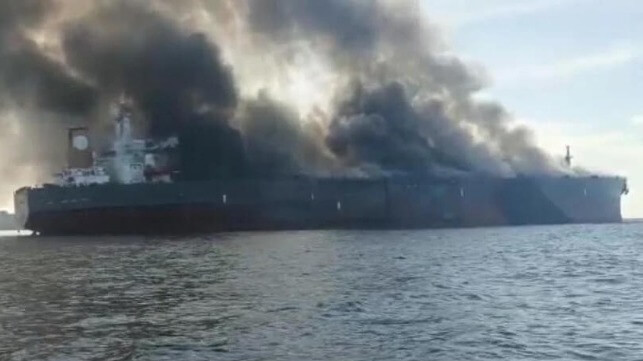IMO Expresses “Grave Concern” as it Moves to Rein In Shadow Fleet Tankers

The International Maritime Organization took aim at the growing “shadow fleet” of tankers calling the ships operating outside international regulation often without insurance a “grave concern” to environmental safety as well as the welfare of crews and coastal states. The actions came as individual nations continue to target the illegally operating ships while the U.S. is increasingly using sanctions in its effort to halt the illegal and dangerous trade.
Expanding on the efforts launched by the Legal Subcommittee, the IMO’s bi-annual general assembly adopted the measures despite the objections and efforts to weaken the measure presented by Russia and Iran. Iran has long been involved in the use of shadow tankers to evade U.S. sanctions including many well-documented cases of ship-to-ship transfer, vessels using false identities, and turning off or faking its AIS position signals.
The number of ship-to-ship transfers however had grown exponentially in 2023 as more tankers are becoming involved in the trade by transporting Russian oil. S&P Global Maritime Intelligence highlighted in a recent that there were over 432 ship-to-ship transfers of Russian oil in the third quarter. Malaysia which is always on the lookout for illegal anchoring has highlighted cases of illegal STS activity seizing tankers especially after a shadow tanker named Pablo exploded in Malaysia waters in May. Singapore has also reported a dramatic increase in detentions after the authorities resumed their inspection programs after the pandemic.
In its role setting international regulations, the IMO lacks the authority to take specific actions but in a strongly worded resolution they are “urging member states” and specific port and flag states to take actions to prevent illegal operations in the ships commonly referred to as the shadow or dark fleet.
The IMO took the decisive step of defining the actions that characterize these ships citing a lack of adherence to international standards and best practices and in doing so endanger their crews and the environment. They called for the flag and port regulators to seek out and inspect ships they suspect of taking actions such as switching off AIS and tracking systems, hiding their identity, or not having adequate insurance. They point out that these ships function by attempting to avoid port and flag inspections.
The resolution identifies “best practices” that should be enacted while it also calls for broader efforts to raise awareness of these vessels and their tactics. They recommend that insurers and owners raise awareness by educating themselves on these tactics and the “red flags” for these efforts. The United States issued a similar advisory a few years ago as it increased its targeting of the shadow fleet serving Iran. They recommended inspecting financial and registration documents, verifying documentation, and looking for actions such as frequent changes in identity, ownership, or flags.
The IMO is also calling for shipowners to review their protocols for ship-to-ship transfers. They recognize that may be a legal step, but they want greater environmental safeguards and are also calling for reporting of planned transfers to flag states. Unreported STS activity would be another “red flag” for the shadow fleet.

that matters most
Get the latest maritime news delivered to your inbox daily.
Increasing port state and flag inspections they believe is the strongest step the IMO can recommend to reduce the shadow fleet activity. This comes as the U.S. appears to be making some headway with its sanctions. The U.S. successfully used the courts to seize cargo from Iran and now the sanctions or threat of action seeking to enforce the G7’s price cap on Russian oil appears to be having an impact.
Reuters recently reported that several Greek shipping companies had vowed to stop transporting Russian oil after getting warnings from the U.S. and several of their peers were caught up in U.S. enforcement actions. One of the tankers the U.S. sanctioned in one of its most recent efforts is reportedly still being held offshore while India debates what to do about the cargo. Similarly, Bloomberg tracked the seven tankers in the recent U.S. sanctions finding at least two appeared to have changed course and two others seemed to be idle not having loaded further cargoes after the U.S. announced its moves.
